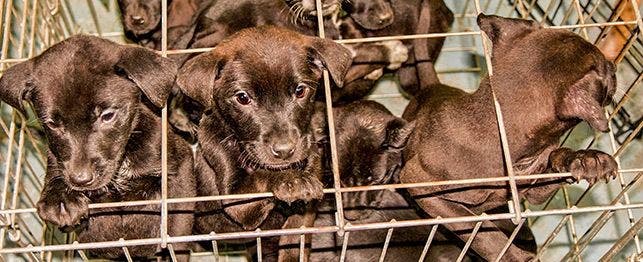
Puppy Mill Bans What You Need to Know
You’ve probably heard the negative things about puppy mills and the way they treat their dogs. It’s enough to make any dog lover cringe, but recently animal advocates have started fighting back in order to create puppy mill bans to stop the sale of puppies from bad owners.
Puppy mills are often tied to pet stores, usually the ones you see in the mall — with sad puppies watching shoppers from behind the walls of their small, soiled cages. What puppy mill bans are trying to do is force stores like these to permanently halt the sale of puppies from mills and require that detailed information about where the puppies come from.
Recently, in Febuary of 2017, the city of San Francisco voted to eliminate the retail sale of any dogs who come from mills. This successful vote will allow more dogs from shelters and rescues to be put out in front to be purchased, rather than being overlooked for a dog who seems like a better option. Shelter dogs are typically in a desperate state of need, and truly need to find a forever home in order to survive. Puppy mill bans help shelter and rescue dogs increase their odds of finding a family that will take care of them, and eradicates the poor practices that go on in puppy mills.
The puppy mill ban also wants the sale of dogs under eight weeks old to be illegal, meaning the puppies will not be able to be stripped from their mothers early and be at a higher risk for significant health issues. This is why many of the puppies from pet stores aren’t the dream come true that their owners thought they would be. These dogs were raised incorrectly, and now are suffering because of it. Puppy mill bans seek to stop puppy mills, which often have no regard for the health of the pups. Instead, their main goal is set on greed — at the expense of the puppies they leave to fend for themselves in the world.
Puppy mills are essentially built on the model of making money, rather than providing puppies to good homes. This means that there is usually no care taken to make sure that the dogs are adequately cared for, because all the owners care about is selling puppies for profit.
Mills are usually run as a disgusting operation meant to breed dogs fast with little attention to their health. The dogs often live in wire cages that are just big enough for them to survive in, and the environment is very unsanitary. In puppy mills, dogs are bred as often as possible in order to get the most profit from a continuous stream of puppies.
Puppy mill bans are a step in the right direction for pet owners to have a better understanding of where their desired dog is coming from so they can refrain from supporting puppy mills.
What Puppy Mill Bans Mean for You and Your Family and How You Can Help
Puppy mill bans like the one in San Francisco help raise awareness to the fact that puppy mills still exist and are trying to take your money. By making sure that families are aware of where puppies from mills are being sold, they can easily avoid these places and buy a puppy that has a safe and healthy background.
Currently there are 18 states with cities enforcing puppy mill bans. On this list are several major cities, like Boston and Philadelphia, who are helping to spread the word that puppy mills are not acceptable by placing a ban on the sale of their dogs.
If you want to help in the fight against puppy mills, the best thing you can do is educate yourself. Before you get a new dog for your family, be aware of where he’s coming from. Don’t order your pup online, and stay out of the pet stores in the mall. These are the most common places for puppies from mills to be found, and your money only goes to help support them. Try talking to the store owner about changing their store to more humane practices, and supporting shelter and rescue dogs who are in dire need of homes.
If you don’t know where your puppy was raised, don’t purchase from that supposed breeder. Puppy mills are still selling millions of dogs each year, and it’s up to dog owners to seek out the frauds and refuse to buy from them. When you do choose to get a dog, go to an adoption agency or a shelter to find a dog in need. One less dog bought from a puppy mill is one more dog towards getting puppy mills banned for good.
Are you pet crazy? Sign up for our email newsletter and get the latest health and wellness info, useful tips, product recalls, fun stuff, and so much more!